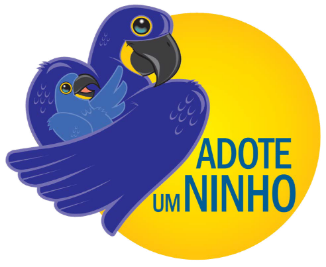The “Adopt a Nest” campaign aims to support the Hyacinth Macaw Project’s actions at Pantanal, through researches and and natural and artificial nests monitoring. The sponsorship of these nests, through the adoption, will provide Pantanal biodiversity maintenance: so much for the hyacinth macaws as to other animal species that can be found in the same cavities.
As they are selective birds, 90% of their nests are found only in Manduvi, a tree species that is decreasing in nature due to wear and tear over time. To meet the demand, artificial nests were created by the Institute’s team of biologists and installed in nature. The speed of loss of natural nests is much greater than the appearance of new nests, therefore, management carried out in natural and artificial nests to increase the number of cavities available for the macaws results in positive increases for the species. That’s why our campaign for the adoption of nests is so important.
In order to find active nests (with eggs and chicks), a large number of nests need to be monitored. In the reproductive period of 2023, for example, in the Pantanal, a total of 1753 monitorings were carried out (climbing up and down from each nest). On average, 10 nests per day were monitored. A nest can be monitored more than once a month, depending on the need. A total of 215 were monitored, 77 nest boxes were managed, 16 boxes/nests were installed, 157 nests were occupied by hyacinth macaws and 55 nests were occupied by other species. .

